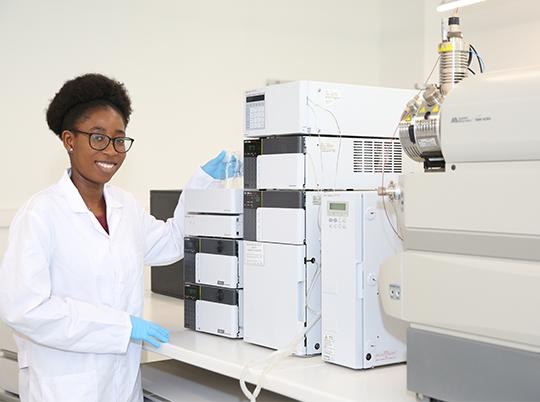


About the Program
The aim of the program is to continue the works of ethical researchers and experts in their field who hold a global reputation in environmental sciences and technologies, the identification and provision of solutions to regional and global environmental problems, the contribution to science, the understanding of global research projects, and put the policies necessary for environmental protection and sustainability into use. In this program, Ph.D. courses deal with sources of soil, water and air pollution, their effects on environment and existing treatment strategies. In addition, students are educated about and by the latest available technologies for identification of the pollutants in environmental matrices. Students are able to conduct their research in environmental research laboratories and also, they can access scientific documents to investigate the related projects across the world.
Education Opportunities
The Ph.D. in Environmental Engineering program at Cyprus International University aims to train researchers to be able to work in the design, operation, supervision, and construction of engineering structures and systems that can ensure the recovery of degraded nature and prevent pollution. Throughout the coursework and thesis study students deal with the main topics of water and wastewater treatment plants, water networks, design of transmission lines, solid waste control, modeling and control of air pollution, environmental management and planning, and noise pollution control. Students benefit from the analysis laboratory, computer rooms, and library to study theoretical and practical components for the courses and thesis. Studies in the field of environmental sciences have an important role in making the world a better place to live in and achieving the objectives of sustainable development.

Career Areas
Graduates of Ph.D. in Environmental Sciences can find employment opportunities in state or private institutions where they would take on project design, implementation and environmental management. As a result of studying in the Department of Environmental Sciences, graduates start their careers in control of the drinking water quality, sewage, the design and construction of storm water networks, as well as the selection, design, construction and operation of domestic and industrial wastewater treatment system, noise pollution control and air pollution and its control. Environmental sciences is a multidisciplinary field therefore; graduates can work together with civil, mechanical, energy engineers as well as political scientists, lawyers and other social scientists in a wide range of projects.
Contact
Institute of Graduate Studies and Research
Graduate Sciences and Education Center, GE106
Tel: +90 392 671 1111 Extension: 2214-2228
Institute E-mail: ciu-institute@ciu.edu.tr
Compulsory Courses
First Semester
SEMINAR
Course code
ENVS690Credit
0Theoretical
0Practical
0Ects
4ELECTIVE I
Course code
ENVS6X1Credit
3Theoretical
3Practical
0Ects
8ELECTIVE II
Course code
ENVS6X2Credit
3Theoretical
3Practical
0Ects
8ELECTIVE III
Course code
ENVS6X3Credit
3Theoretical
3Practical
0Ects
8ELECTIVE IV
Course code
ENVS6X4Credit
3Theoretical
3Practical
0Ects
8Second Semester
QUALIFICATION EXAM
Course code
ENVS650Credit
0Theoretical
0Practical
0Ects
20ELECTIVE V
Course code
ENVS6X5Credit
3Theoretical
3Practical
0Ects
8ELECTIVE VI
Course code
ENVS6X6Credit
3Theoretical
3Practical
0Ects
8Philosophy of Science
Course code
PHIL601Credit
3Theoretical
3Practical
0Ects
8Third Semester
THESIS
Course code
ENVS600Credit
0Theoretical
0Practical
0Ects
160Elective Courses
SPECIAL TOPICS IN ENVIRONMENTAL SCIENCES
Course code
ENVS633Credit
3Theoretical
3Practical
0Ects
ADVANCED TOPICS IN AIR POLLUTION
Course code
ENVS611Credit
3Theoretical
3Practical
0Ects
ADVANCED WATER CHEMISTRY
Course code
ENVS629Credit
3Theoretical
3Practical
0Ects
RESEARCH METHODS
Course code
EMNT525Credit
3Theoretical
3Practical
0Ects
0ADVANCED TOPICS IN BIOTECHNOLOGY
Course code
ENVS614Credit
3Theoretical
3Practical
0Ects
THEORY AND APPLICATION OF ADSORPTION
Course code
ENVS612Credit
3Theoretical
3Practical
0Ects
STATISTICAL METHODS IN BIO&ENVIRONMENTAL SCIENCES
Course code
ENVS641Credit
3Theoretical
3Practical
0Ects
ADVANCED TOPICS IN HAZARDOUS AND TOXIC WASTES TREATMENT & CONTROL
Course code
ENVS623Credit
3Theoretical
3Practical
0Ects
LABORATORY APPLICATIONS IN ENVIRONMENTAL AND BIO TECHNOLOGIES
Course code
ENVS640Credit
3Theoretical
3Practical
0Ects
ECOLOGY
Course code
ENVS502Credit
3Theoretical
3Practical
0Ects
BIONANOTECHNOLOGY
Course code
BIOE622Credit
3Theoretical
3Practical
0Ects
ADVANCED ANAEROBIC TREATMENT
Course code
ENVS609Credit
3Theoretical
3Practical
0Ects
ION EXCHANGE PROCESSES
Course code
ENVS610Credit
3Theoretical
3Practical
0Ects
BIOSEPERATIONS
Course code
BIOE606Credit
3Theoretical
3Practical
0Ects
FERMENTATION MICROBIOLOGY
Course code
BIOE631Credit
3Theoretical
3Practical
0Ects
ENVIRONMENTAL ENGINEERING CHEMISTRY II
Course code
ENVE202Credit
0Theoretical
0Practical
0Ects
8PHYSIOLOGY FOR ENGINEERS
Course code
BIOE613Credit
3Theoretical
3Practical
0Ects
ADVANCED RESEARCH METHODS FOR ENGINEERING
Course code
ENGI660Credit
3Theoretical
3Practical
0Ects
8BIOMATERIALS
Course code
BIOE616Credit
3Theoretical
3Practical
0Ects
REMOVAL OF ORGANICS FROM WATER
Course code
ENVE513Credit
3Theoretical
3Practical
0Ects
TECHNIQUES IN TISSUE CULTURE AND CELLULAR BIOENGINEERING
Course code
BIOE602Credit
3Theoretical
3Practical
0Ects
STATISTICS AND DATA ANALYSIS
Course code
BIOE605Credit
3Theoretical
3Practical
0Ects
ECOLOGY
Course code
BIOE626Credit
3Theoretical
3Practical
0Ects
ENVIRONMENTAL ENGINEERING CHEMISTRY I
Course code
ENVE201Credit
0Theoretical
0Practical
0Ects
ADVANCED OXIDATION PROCESSES
Course code
ENVE512Credit
3Theoretical
3Practical
0Ects
ADVANCED OXIDATION PROCESSES
Course code
ENVS512Credit
3Theoretical
3Practical
0Ects
BIOSENSORS
Course code
BIOE507Credit
3Theoretical
3Practical
0Ects
TECHNIQUES IN MOLECULAR BIOENGINEERING
Course code
BIOE601Credit
3Theoretical
3Practical
0Ects
Philosophy of Science
Course code
PHIL601Credit
3Theoretical
3Practical
0Ects
8ANALYTICAL DECISION MAKING
Course code
MISY602Credit
3Theoretical
3Practical
0Ects
ADVANCED BIOLOGICAL NUTRIENT REMOVAL
Course code
ENVS625Credit
3Theoretical
3Practical
0Ects
BIONANOTECHNOLOGY
Course code
BIOE522Credit
3Theoretical
3Practical
0Ects
GENETIC ENGINEERING
Course code
BIOE610Credit
3Theoretical
3Practical
0Ects
CALCULUS I
Course code
MAT101Credit
0Theoretical
0Practical
0Ects
SPECIAL TOPICS IN ENVIRONMENTAL SCIENCES II
Course code
ENVS639Credit
3Theoretical
3Practical
0Ects
SPECIAL TOPICS IN ENVIRONMENTAL ENGINEERING
Course code
ENVE633Credit
3Theoretical
3Practical
0Ects
STATISTICAL COMPUTER APPLICATIONS FOR SOCIAL SCIENCES
Course code
STAT602Credit
3Theoretical
3Practical
0Ects
0TOTAL QUALITY MANAGEMENT
Course code
EMNT502Credit
3Theoretical
3Practical
0Ects
0ADVANCED TOPICS IN AIR POLLUTION
Course code
ENVE611Credit
3Theoretical
3Practical
0Ects
ADVANCED TOPICS IN HAZARDOUS AND TOXIC WASTES TREATMENT & CONTROL
Course code
ENVE623Credit
3Theoretical
3Practical
0Ects
HAZARDOUS AND TOXIC WASTES-TREATMENT AND CONTROL
Course code
ENVS505Credit
3Theoretical
3Practical
0Ects
INDUSTRIAL WASTE TREATMENT
Course code
ENVS523Credit
3Theoretical
3Practical
0Ects
SPECIAL TOPICS IN ADVANCED OXIDATION PROCESSES
Course code
ENVS619Credit
3Theoretical
3Practical
0Ects
ENERGY - PAST, PRESENT & FUTURE
Course code
ENRE501Credit
3Theoretical
3Practical
0Ects
0ADVANCED SOLAR ENERGY UTILIZATION
Course code
ENRE607Credit
3Theoretical
3Practical
0Ects
TECHNIQUES IN TISSUE CULTURE AND CELLULAR BIOENGINEERING
Course code
BIOE502Credit
3Theoretical
3Practical
0Ects
TISSUE ENGINEERING
Course code
BIOE612Credit
3Theoretical
3Practical
0Ects
BIOTECHNOLOGY
Course code
BIOE635Credit
3Theoretical
3Practical
0Ects
METABOLISM AND CELLULAR ADAPTATION
Course code
BIOE636Credit
3Theoretical
3Practical
0Ects
INTRODUCTION TO PROBABILITY AND STATISTICS
Course code
MAT205Credit
0Theoretical
0Practical
0Ects
ENVIRONMENTAL ENGINEERING ANALYTICAL CHEMISTRY
Course code
ENVE104Credit
0Theoretical
0Practical
0Ects
LABORATORY APPLICATIONS IN ENVIRONMENTAL AND BIO TECHNOLOGIES
Course code
ENVS540Credit
3Theoretical
3Practical
0Ects
Students who are interested in pursuing advanced graduate studies leading to a master’s, doctoral degree or professional doctorate degree for the Fall and Spring semesters every year. Applicants can directly apply online to our graduate programs using the application portal.
TRNC Applicants- Required documents:
- Bachelor’s and Master’s Degree Diploma
- Bachelor’s and Master’s Degree transcripts for each completed academic term/year.
- Documents to prove English proficiency for English language departments,
- Scanned copy of passport or identity card.
Click for detailed admission requirements information.
Students who are interested in pursuing advanced graduate studies leading to a master’s, doctoral degree, or professional doctorate degree for the Fall and Spring semesters every year. Applicants can directly apply online to our graduate programs using the application portal.
International Applicants- Required documents:
- A valid Bachelor’s Degree and transcripts for each completed academic term/year.
- A valid Master’s Degree and transcripts for each completed academic term/year.
- Evidence of English Language competence: TOEFL (65 IBT) or IELTS (5.5). Students without these documents will take the CIU English proficiency exam on campus following arrival.
- Scanned copy of international passport/birth certificate
- CV
- Ph.D. research proposal
- Fully completed and signed CIU Rules and Regulations document (which can be downloaded during the online application)
Click for detailed admission requirements information.
Cyprus International University provides academic scholarships for its students as an incentive for success, with most students benefiting from 50%, 75% or 100% scholarships or discounted tuition fees. Click for more information.
Tuition Fees are determined at the beginning of each academic year. Candidate students who are entitled to enroll in CIU can learn their fees in line with the Tuition Fee Calculation system.